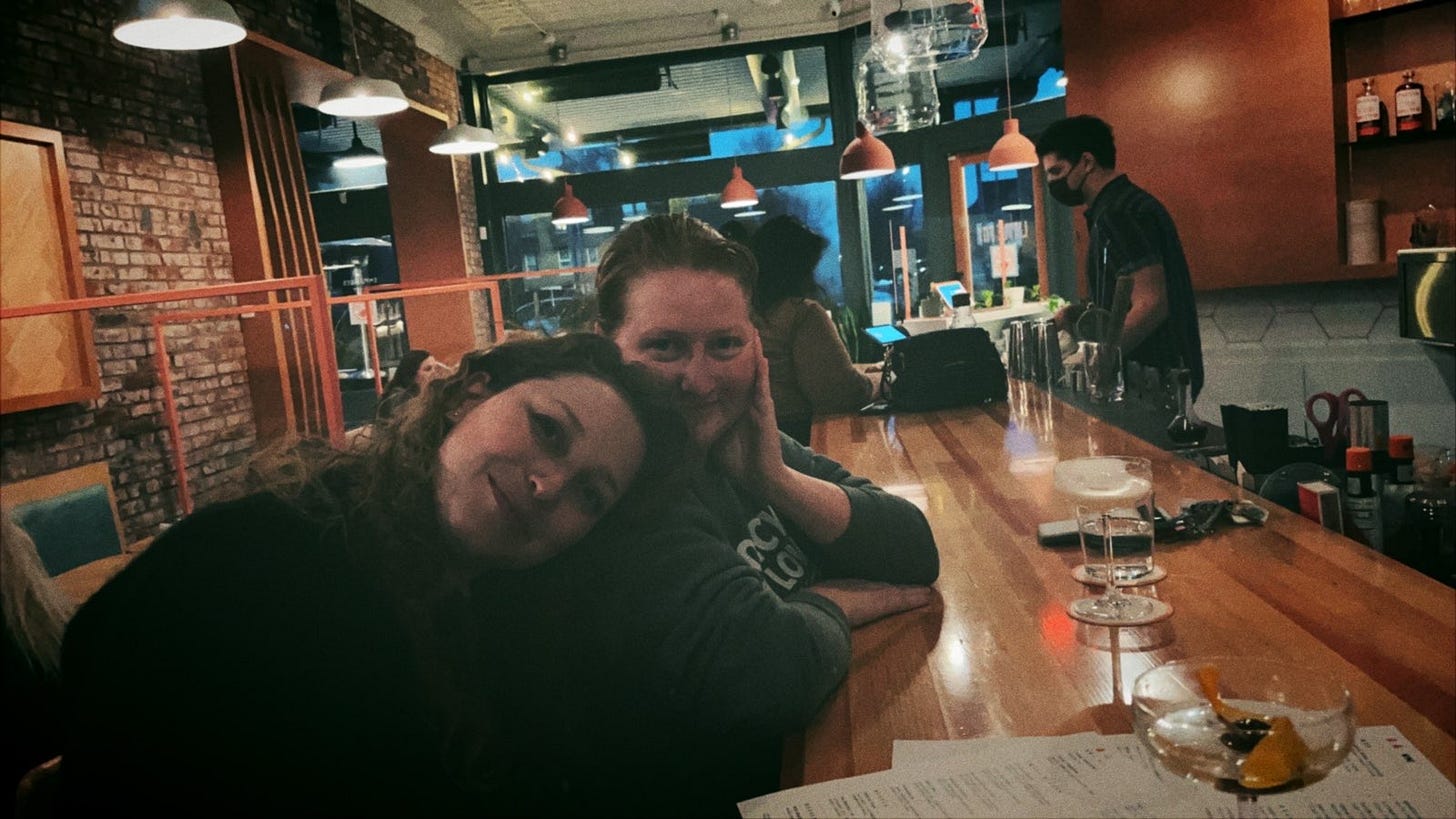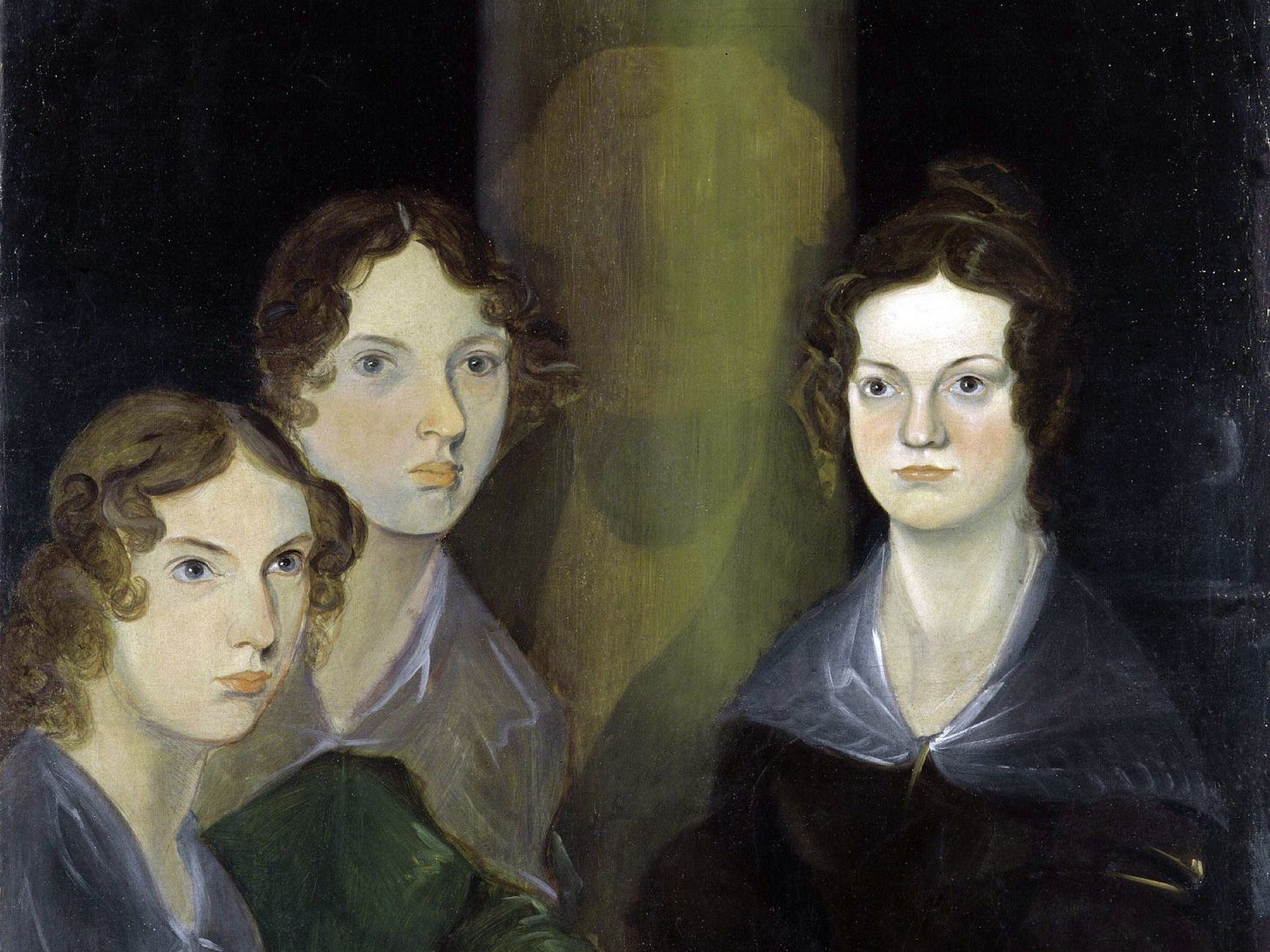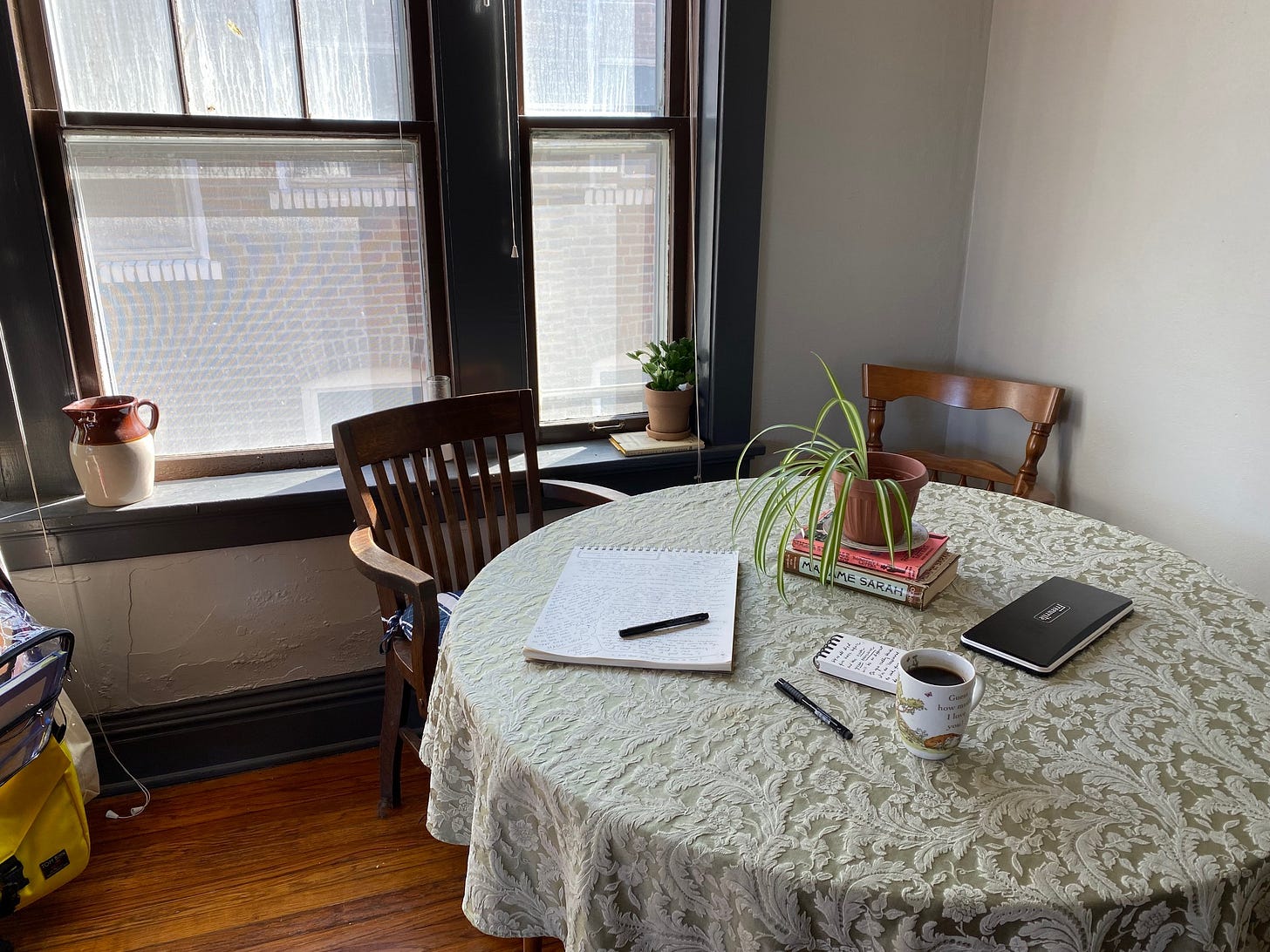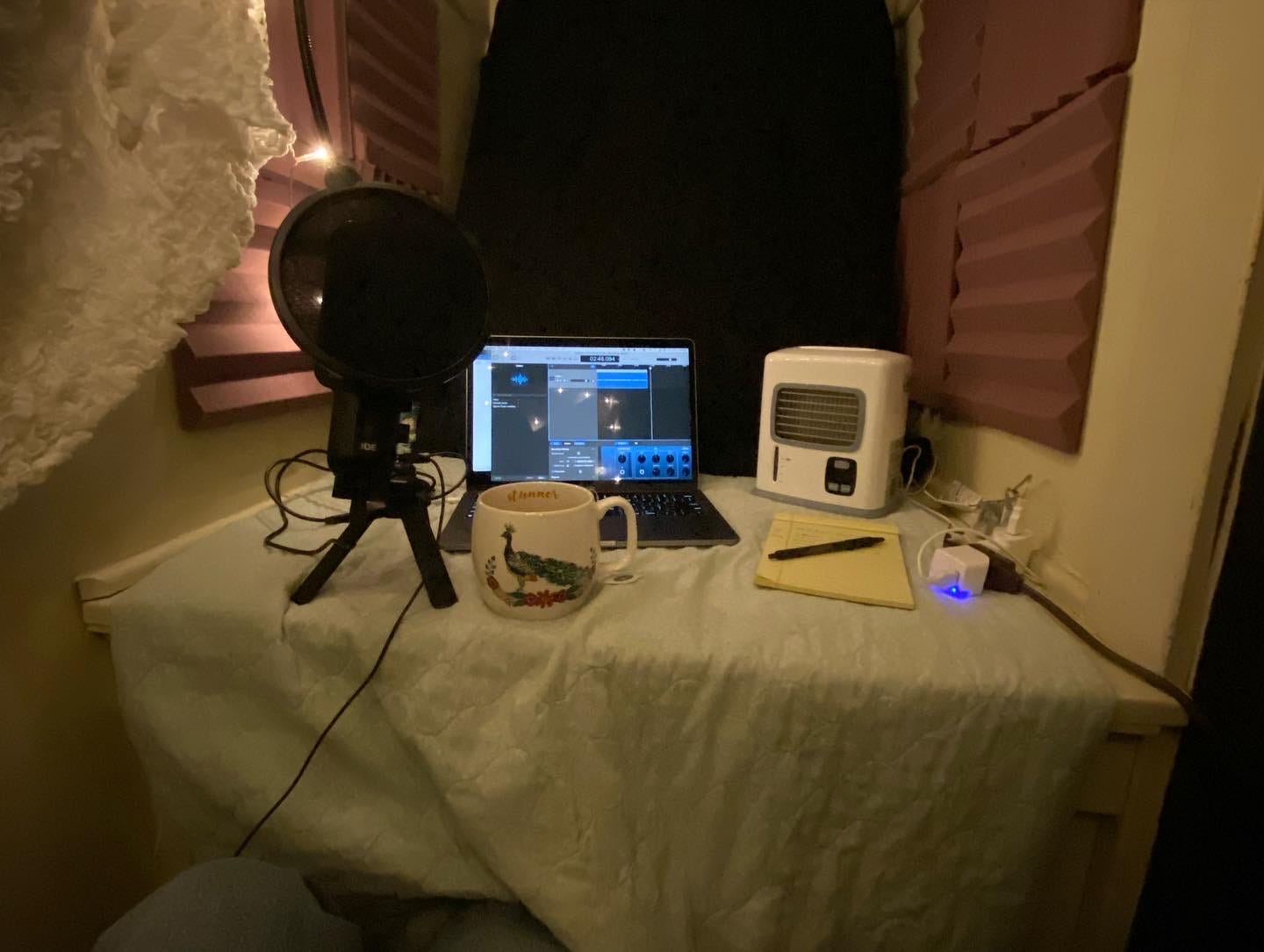Letters from the Homestead: February 2022
My new play's big debut, some writing practices that are working for me right now, and a few thoughts about Lent.
Emily Dickinson called her Amherst home “The Homestead.” I lovingly call my apartment in St. Louis the same thing (although I definitely get out more than Dickinson). This monthly newsletter is my attempt to work through what it feels like to put down roots as an artist in my own Homestead. In it, I’m honest about what’s saving my life right now, what’s hard, and what I’m pouring my energy into.
(If you hate it, don’t worry; you can unsubscribe anytime through the link in the footer. And if this e-mail found its way to your inbox by other means and you dig it, subscribe below!)
Brontë Sister House Party is COMING SOON for your play-going pleasure. Let’s party!
It is time. The Brontë sisters have spent centuries throwing a fabulous house party every night in a purgatorial time-loop. Determined to reach The Point of Celebratory Reverence (the highest point of fun that a party can achieve—I promise you, it’s a thing), they throw their party in hopes that it will be fun and they’ll finally be released from their purgatorial time-loop prison. British pop sensation Kate Bush is also there. It’s been stressful for everyone, including me—trying to write them into existence and get them (and me) out of this time-loop.
And now we’re almost there. It’s party time.
Listen, I came up with this play idea as a bit. Like, a funny bit. Like, a bit that was never supposed to be an actual thing. Knowing literally nothing about what the bit-as-play would look like, I proposed this play for a playwriting fellowship using the argument of “I think this could be a really funny bit.” And now it is a play.
This, my friends, is one way of making a play. (Possibly the best way, actually.)
But now, the Brontë sisters are getting a real debut. It’s time for their very first public reading at the St. Louis Shakespeare Festival on March 18th @ 7:30 pm! This reading is the culminating presentation of my fellowship year with the Confluence Writers Project, and I’m so happy-grateful to finally get to see a staged reading of this piece.
Writing this play has felt like writing my way out of the pandemic. I wanted to write a play that was joyful and weird, but that still had something to say about what happens when we feel like our lives are nothing but a purgatorial time-loop of repetition. The funny thing about this pandemic is that all the “releases” we’ve hoped for are often met with some sort of new upheaval: the slowness of vaccine accessibility, the Delta and Omicron variants, breakthrough cases, etc. and etc.
Things feel hopeful with the return of warm weather. But I can’t help but remember how hopeful I felt this time last year when I was patiently waiting to sign up for a vaccine appointment. There’s still this looming fear that things will be thwarted again. (In fact, this play reading was supposed to happen in January, but Omicron showed up and ruined the plan.)
While writing Brontë Sister House Party, I wrestled with a lot of this tension in myself. Only after I’d submitted the play, my fellowship year complete, did I realize that I’d written out three different versions of myself: Charlotte, Emily, and Anne Brontë. Each one of them told some of my secrets. I wrote about this recently in one of my Secret Letters, a monthly extra letter that I write to paid subscribers. (You can see a short preview if you click on this embedded link.)
Oh, and guess what, wait a few more months and you can see THE REAL SHOW. THAT’S RIGHT, THERE’S GOING TO BE A REAL SHOW.
This is such a good thing. I cannot even begin to express to you how much of a good thing this is. Save the date for Brontë Sister House Party in August with SATE Ensemble Theatre here in St. Louis!
Some writing practices that are working for me right now…
These winter months are the time of year when I get the most writing done, and this year has been no exception. As a writer, I’ve found that my writing practices/habits change seasonally, my mind shifting with the weather to feel like it only works best in certain corners of the apartment. I have a perfectly nice nook-office where I love to work, but lately I’ve been clearing off the kitchen table, turning on my fuzzy-sounding clock radio to KDHX, and writing with only the essentials in front of me.
This “stripping away” has helped so much. Right after the holidays, I was feeling a little stuck with all my writing projects. I sometimes call it the “holiday hangover,” where you can’t seem to do much of anything other than binge TV and order take-out. Same goes for your motivation to write—during the holiday hangover, there is almost nothing left in my tank to be creative. But then February gets closer, the first real snow comes, and suddenly things get a little clearer.
Things got a little clearer this month, for sure.
Maybe it’s the motivation of an upcoming play reading (which makes me feel like a Real Playwright); maybe it’s the cold weather that keeps me inside, close to my desk. Whatever it is, I’m embracing it.
Two things that have been working for me lately: 1) working on my new novel project with just a notepad and my fancy Freewrite (it’s one of the bougiest things I own, and I own a lot of bougie things). And 2) mapping out a new play project with a big piece of drawing paper.
These two small things have been like magic for me.

I’ve always been baffled by writers who claim that they have the exact same writing routine each day, and they never stray from that schedule. This isn’t me. I need new practices, new spaces, and constantly renewing pulsations of urgency to keep me working.
And, thank the gods, I’m working right now.
A well-timed season of Lent (+ what I’m reading)
Every month in Letters from the Homestead, I list out the books I’ve been reading that month. This month, I thought instead I’d tell you the books I’m (ambitiously) setting out to read during the Forty Days of Lent.
But first, could I say some things about Lent?
Lent feels well-timed this year with the chaos of our world. I’m a print subscriber of the New York Times, and I’ve watched daily as the headlines about Ukraine and Russia grow bigger and bolder, the black print taking up increasingly more space at the top of page one. And in my own country, I’ve been baffled by the political theatre of Texas, in which the governor announced that parents seeking gender-affirming healthcare for their trans children would be maligned as child abusers.
“Remember you will die,” says the priest on Ash Wednesday. Would these affronts to humanity happen so readily if we cradled these words like the mantra they are?
I don’t consider myself a Christian anymore, but I tell you what, I seem to get my religion back when Lent rolls around—this year especially. Some people might argue that it’s the gloomiest season in the liturgical calendar, but it is absolutely my favorite part of the Christian Year. It’s bleak and gothic, heavy with its own sense of mindfulness. And at the end of forty days, spring is here.
This Lent, I’m fasting from alcohol and making a weekly trip to Kate Chopin’s grave here in St. Louis. Maybe one of the reasons I like Lent is because a “graveyard trip” is totally acceptable? Chopin’s grave is pretty neat, actually, and I think it’s essential visiting if you’re a St. Louis writer. Chopin’s most well-known work, The Awakening, is set mostly at the ocean, and so people bring seashells to leave at her modest grave in her family plot. When I visit it, I feel like I’m reckoning with how little control I have as a writer over how far my work will reach—after all, Chopin’s work didn’t start to really resonate until after her death.
And yet the little seashells on her grave marker speak volumes of that resonance.
Here’s my (admittedly super ambitious) Lenten reading list:
My Grandmother’s Hands: Racialized Trauma and the Pathway to Mending Our Hearts and Bodies by Resmaa Menakem. I first learned about this book from an episode of On Being where Menakem was interviewed. This book considers the ways in which racialized trauma continues to live in bodies, both for the oppressed and the oppressor. As a southerner, I think about this phenomenon a great deal: What baggage does my body carry because of my white, southern ancestry? What harms am I capable of because it is wrapped up in my DNA? What haunts my genetics? How do I notice it, wrangle it, and redirect it toward something reparative?
The Long Loneliness: The Autobiography by Dorothy Day. Did you know that the Catholic Church is currently considering making Dorothy Day a saint, but they are stalled because they are hung up on her “wild youth”? (I promise you this would not be an issue if she were a man.) I’m fascinated by people who truly do attempt to live alongside the poor: to meet present needs (like a meal or a place to sleep) instead of becoming so bogged down in changing the system that someone ends up going hungry anyway. Dorothy Day is one of those amazing people who managed to do something of both.
The Supper of the Lamb: A Culinary Reflection by Robert Farrar Capon. I was once at a dinner party in graduate school where the host read aloud a section of this book before we began our meal. I remember we ate at a grand table in a house that our host didn’t even live in—they were only house-sitting, and they decided to use the opportunity to throw a dinner party. (I don’t know if the actual house owners knew about this…) She read aloud, “Food is the daily sacrament of unnecessary goodness, ordained for a continual remembrance that the world will always be more delicious than it is useful.” I love to read this book during Lent. It reminds me that “to fast” doesn’t mean that I stop trying to make things delicious. After all, we were a bunch of poor grad students in a stolen dining room, feasting with what we had.
Making Contact: Jill Tarter and the Search for Extraterrestrial Intelligence by Sarah Scoles. I know what you’re thinking: Why would you read a book about someone who’s dedicated their life to searching for extraterrestrials during Lent? Well… because it makes sense to me? That’s why? In all honestly, I’ve been listening to the audiobook of Carl Sagan’s Contact, which is partly based on Jill Tarter, so I wanted to know more about the woman behind the Jodie Foster character.
I’m pretty sure I won’t finish all these titles, but I want to have a stack of books that I intentionally dip into this month over the majority of Lent.
How I made money this month $$$
I believe freelance artists should be more upfront about how they support themselves financially, so this is me attempting to live out that principle. Here are all the ways I brought money into the Homestead for February.
Audiobook narration. Always with the audiobooks! I got a nice break over the holidays, which gave me time to clean out a larger closet in my apartment to fully transform it into a more comfortable home studio. But now I’m back at it, mostly narrating romance novels.
New romance novel contracts. I signed two romance novel contracts for this quarter, tentatively titled Stealing the Scholar’s Heart and Valerie Falls in Love with a Voice. They are both sapphic contemporary romantic comedies, so this will be a nice shift away from doing “Jane Austen inspired” books.
Facilitating/Consulting for an online education company. I’ve been doing this for several months now, and I’m liking how it’s a simple extra income stream. It’s mostly grading for graduate courses that I’ve already built.
Paid Substack subscriptions. Thank you so much, paid subscribers. It means the world to me that you would support my work in this way.

Cheers to the coming of spring.
Lent makes way for spring, and I love it. I hope that you’re experiencing some brief moments of thaw, wherever you are. (One thing I’ve had to get used to in the Midwest is the idea of a “false spring.” This was definitely not a thing in the South.)
Midge the cat is perpetually angry at me for the cold, defiantly loafing in front of the heater. Spring will bring her forgiveness (I hope).
Thank you for reading.
Yours ever, & etc., etc.,
Courtney, Mistress of the Homestead and Noble Midge the Cat 🐈⬛















